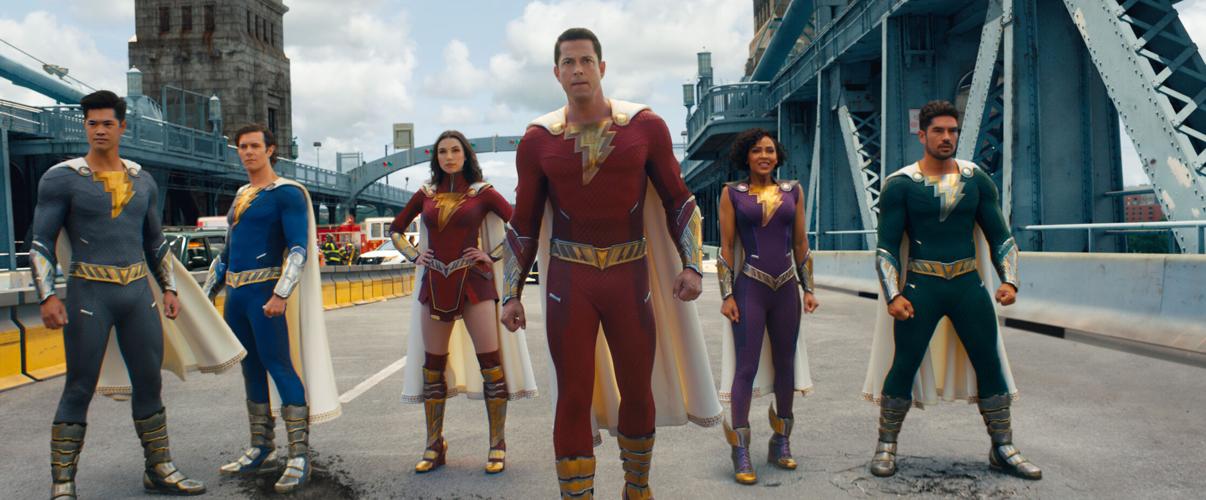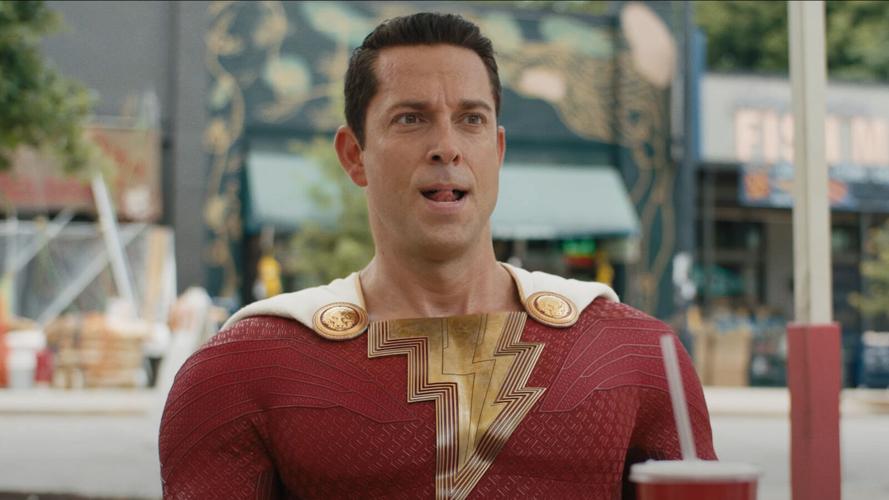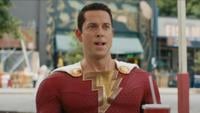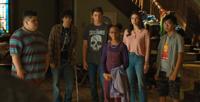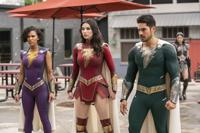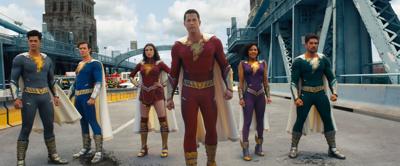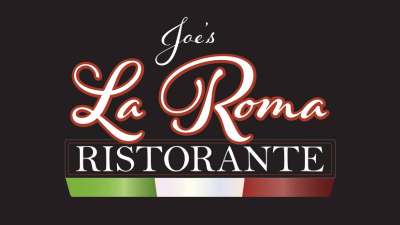This is the 12th entry in the DC Extended Universe (DCEU), the series of super hero films that began with Zack Snyder's Man of Steel (2013), the origin story and darker take on the comic book character of Superman. The best entry was the fourth, that of Wonder Woman (2017). Unfortunately, the franchise started going downhill, almost from the beginning. It quickly built to a team-up between DC Comics' most iconic heroes in Justice League (2017), but that live-action flick was a flop.
Warner Bros. turned to horror film directors like James Wan to do Aquaman (2018) and David F. Sandberg to do Shazam! (2019), which was based on a lesser known super hero and it was an obvious pivot away from the darker take that has been pervasive as a tone in the DCEU, mainly due to Snyder's influence. Yet, it's clear that Sandberg who returns as director for this sequel was given a memo from above to be lighter or more comedic. There's still some dark edge here, which is typical for Sandberg, but it's clear he got that memo.

Zachary Levi (Heroes Reborn and Chuck) reprises his role as the super-powered version of Billy Batson, a teenage boy who was put into a foster home in Philadelphia. Billy was given the powers of the Gods from a magical wizard. When Billy said the word "Shazam," he would literally transform from being a teenage boy, played by Asher Angel, into the tall, goofy beefcake, played by Levi. His personality would also totally change into that of a stand-up comic. It's clear that Levi comes from the school of Ryan Reynolds in terms of style of humor. Arguably, Levi isn't as snarky. Levi also isn't as wry as Reynolds. He's more upbeat and charming. His Billy Batson though does have abandonment issues with which he has to reckon throughout the film.
Weirdly enough, I found this film to be funnier than the last. It's not to say that the previous wasn't funny. It's bogged down by the fact that it's an origin story. In general, origin stories don't engage me as much. That, and this film's origins had some pretty depressing and horrific elements that mostly overwhelmed it. Sandberg doesn't allow those elements to overwhelm this time. It makes this one more entertaining. It zips along in a way that doesn't make it feel overstuffed or bloated. It's weird because in theory this film has more characters to juggle. It doesn't have the time to develop them all. It barely has enough to give them all something to do or something to make them all memorable or stand out. It's all buoyed by Levi's style and one other's.

Jack Dylan Grazer (Luca and It) also reprises his role of Freddy Freeman, the foster brother to Billy who's physically disabled. Grazer is the true comic relief here. He steals every scene he's in. He gives Levi a definite run for his money. It's not surprising that the film prefers to have Grazer on screen than his super-powered alter ego, played by Adam Brody (Fleishman Is In Trouble and The O.C.). Brody can be very hilarious and is a perfect alter ego to Grazer's character, in that Brody's performance feels more consistent to Grazer's, but Grazer eclipses anyone else in a scene with him with an almost manic energy on par with some of the greatest comedic actors.
Like Billy, Freddy was given the powers of the Gods. He and his other foster siblings were given those same powers. However, this film, written by Henry Gayden (Earth to Echo) and Chris Morgan (Fast & Furious), doesn't delve into those other foster siblings, as much as Freddy. Freddy gets most of the screen time. Of all the children, Freddy is clearly the favored one of the filmmakers. Morgan who has written several of the films in The Fast and the Furious franchise is used to juggling large familial casts, but the balance is off here.

Other than Billy and Freddy, there are four other foster siblings. The film gives each of them a quirk or some kind of distinguishing feature. Unfortunately, the film doesn't have enough time to explore all of them to any significant degree. It's mostly superficial, not exploring their inner worlds to any deeper depths.
The idea of being a child who can transform into an adult with god-like powers is an idea that still feels hollow here. Through Freddy, we get a little bit of that idea, but there's little nuance to it. For example, one of the foster siblings is Pedro Peña, played by Jovan Armand as a teenager, and played by D. J. Cotrona as the adult super hero. Armand is playing Pedro as an overweight, shy kid. Cotrona is playing him as a muscularly hunky adult. It's one of the most dramatic shifts in body image that this film does not explore. We don't get what Pedro feels about it or which body he prefers. Nothing!

Similarly, it's revealed that Pedro is gay. Aside from the tokenism of his presence, of which many big budget films are guilty, the film does nothing with it. His identity is name-checked and name-checked only. It's as if him being gay was merely a quota being fulfilled in this blockbuster without giving any substance to it. Chloé Zhao's Eternals (2021) remains the only super-hero film that doesn't engage in gay tokenism but actually goes deeper.
Otherwise, this film is set in my hometown of Philadelphia. A lot of the shoot was done in Atlanta, but Sandberg does incorporate a lot of Philly iconography like the Ben Franklin Bridge and Citizens Bank Park. For those who like fantasy and action, there's enough here to give Dungeons & Dragons: Honor Among Thieves (2023) a run for its money. As I watched, I thought of a joke. Djimon Hounsou plays the wizard who gives Billy his powers. He spends a lot of time in a jail cell, which reminded me of HBO's Oz, a series about a prison. Hounsou could then be considered a wizard of Oz.

Rated PG-13 for action, violence and language.
Running Time: 2 hrs. and 10 mins.
In theaters.

